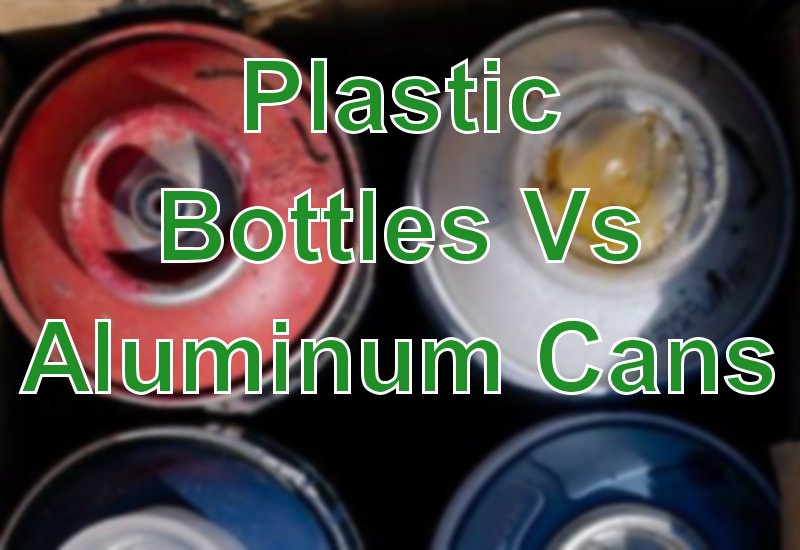Plastic Bottles Vs Aluminum Cans

Plastic Bottles Versus Aluminum Cans: Who Will Win The Global Fight For Water?
Bottled water multinationals are intensifying tests with easily recyclable aluminum cans to replace the plastic that pollutes the world’s seas. A win for the environment? Not at all.
The Beverage Industry Has Been Making Efforts To Address Public Upset Over Scenes Of Piles Of Plastic Waste Polluting The Oceans By Committing To Increased Recycling Programs. However, Not Everything Is Black And White On The Green Front
Aluminum cans may mean less ocean waste, but they come with their own ecological cost: The production of each can sends roughly twice as much carbon dioxide into the atmosphere as each plastic bottle.
The French group Danone has joined these initiatives, announcing to Reuters that it had begun to replace some plastic bottles with aluminum cans for local water brands in the United Kingdom, Poland, and Denmark.
This previously unknown plan comes at a time when multinational rivals such as Coca-Cola Co, PepsiCo, and Nestlé are also launching canned versions of water brands.
The beverage industry has been struggling to deal with public outrage over scenes of huge piles of plastic waste polluting the oceans by pledging to increase recycling programs.
However, not everything is black and white on the green front. By increasing recycling through cans, companies may be undermining their efforts to reduce their carbon footprint, illustrating the juggling job they can face to please investors, activists, and environmentally conscious consumers.
“That’s the dilemma where you have to choose,” says Ruben Griffioen, director of sustainability for Heineken’s packaging materials, adding that the company was trying to reduce both plastic waste and emissions.
Recycling plastic is more complex, a degradation process is recorded and there are lower rates of reuse than with aluminum, which is why the metal has been presented as a more ecological alternative. Can have an average of 68% recycled content compared to just 3% for plastic in the United States, according to data from the Environmental Protection Agency.
The new watermarks are also causing a sensation
“Mananalu will rid the world of plastic water containers and start a wave of change,” says the website for the new canned water launched by Hollywood actor Jason Momoa, known for playing Aquaman. Another company, Liquid Death, proclaims its “green cans” and uses the hashtag #DeathtoPlastic (“Death to plastic”).
“The aluminum industry can play on the fact that their product is infinitely recyclable, and they are right,” says Martin Barrow, director of ecological footprint at UK-based non-profit consultancy Carbon Trust.
“But primary aluminum uses large amounts of electricity and also has some greenhouse gas chemical emissions,” he explained.
Comparing the carbon dioxide footprints of aluminum and plastics is a complex calculation because making the metal with hydropower instead of fossil fuels lowers emissions while using recycled aluminum lowers them even more.
However, when all metal types are averaged, can still account for about twice as much greenhouse gas as plastic bottles, Barrow notes, referring to Europe’s figures.
At the most polluting level of aluminum, a 330-milliliter can is responsible for 1,300 grams of carbon dioxide emissions, according to an analysis compiled by Reuters, which is roughly equivalent to the emissions produced by driving a car 7 to 8 kilometers.
A plastic bottle of the same size, made from the polyethylene terephthalate (PET) plastic commonly used for these products, represents up to 330 grams.
“It’s a level of growth we haven’t seen in a long time. We’re looking at several projects to speed things up, new lines of cans,” said Kathleen Pitre, director of business and sustainability for Ball’s global beverage packaging business.
Ball told investors that by mid-2012 it planned to increase its capacity by 4-5 billion cans, currently at 105 billion units, but this does not even take into account the potential for expansion in the water sector.
A shift of just 1% of the world’s soft drinks, beer, and bottled water from plastic and glass into cans would mean an increase of 24 billion cans, said the company, the third-highest riser in the S&P 500 index in the world. the last 12 months.
This 1% change would increase demand for aluminum by about 310,000 tons, according to Patel at Wood Mackenzie, and further changes could offset the general weakness in the aluminum market.
Major producers Alcoa and Norsk Hydro have recently lowered estimates of global demand growth for aluminum, due in part to trade tensions between the United States and top metals consumer China.
“It’s about billions and billions of water bottles, so there’s a potential revival of the aluminum can market,” Patel said. “But it will take three or four years to see if it is a real trend.”
ABOUT ecoGnome
Leading a sustainable lifestyle means wholeheartedly embracing respect for the environment and making a positive impact for people and the planet.
Click to read on